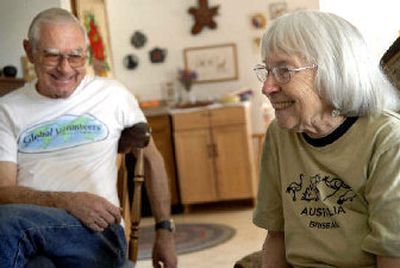Couple vacation to work

The Wakka Wakka aboriginal tribe in Cherbourg, Queensland, Australia, received a visit from a north Spokane couple in January.
George and Doris Dyer made the trip as part of Global Volunteers, a nonprofit secular organization that helps people take volunteer vacations – trips to help other people and their communities in different parts of the world.
The Dyers say they were surprised by the warm welcome they received from the Wakka Wakka.
“The Aborigines have, with good reason, a mistrust of whites,” Doris Dyer said. But when the couple arrived in the village, the two noticed only a few elders who were distant and aloof, but for the most part, the people were friendly and kind.
Cherbourg was founded in 1904 when the Australian government forcefully relocated the tribe to the area. The Wakka Wakka were forced to work as farm laborers and domestic workers for white people living nearby, and so families were separated.
The Aborigines were forced to abandon their language – that is why they speak English now – with the exception of a few elders who are working to teach their language to younger generations.
The tribe also was forced to accept food rations the government sent, so many of the native dishes no longer are prepared today.
The Aborigines weren’t even considered total human beings by the Australian government until the mid-1980s.
George Dyer, 80, helped build a fence around the tribe’s ancestral cemetery, which had fallen into disrepair since the last Wakka Wakka member was buried there in 1939. Free-roaming animals, weather and time have damaged the cemetery; grave markers have been knocked over, and many of the names of the dead have been erased.
Doris Dyer, 79, helped in the kitchens and worked in the garden.
The tribe is fairly laid-back and relaxed, and members don’t work at the same pace Americans do. The Dyers had to get used to the different pace.
“The key is: We do not initiate anything,” George Dyer said. “If they don’t work, we don’t work.”
During the Dyers’ three weeks with the Wakka Wakka, 10 tribe members died, and everything was shut down. Families came from all over to mourn and prepare a feast.
The cost of the Dyers’ volunteer vacation wasn’t small. Program fees for the two of them came to around $3,000, which didn’t include airfare.
The fees paid for their food, lodging, transportation between the airport and the host community, materials for the projects the volunteers worked on in the village and administrative fees.
The volunteers are responsible for any free-time pocket money, rental cars and visas.
But the Dyers were quick to point out that every penny they spent is tax-deductible.
It’s not the first volunteer vacation the two have taken. Doris Dyer first got involved with the program in 1996 when she took a trip to Jamaica.
Since then, the two also have visited Crete and Ireland.
The volunteers have time on weekends to explore the region. In Australia, the Dyers visited Bunya Mountains National Park, listened to a didgeridoo player and watched a traditional Wakka Wakka dance performance.
Doris Dyer said the boys of the tribe must keep their school grades up to participate with the dance group.
The couple have been married 56 years. Doris Dyer worked as a paralegal, and George Dyer was a sixth-grade teacher before they retired. They moved to Spokane two years ago to live closer to one of their five sons. They also have a daughter.
The two say they would be hard-pressed to pick a favorite volunteer vacation. Although Doris Dyer didn’t like teaching English in Crete – she said she prefers physical work – the experience in general was wonderful.
“We’ve loved them all,” she said.